

Austria has submitted films for the Academy Award for Best Foreign Language Film since 1961. The award is handed out annually by the United States Academy of Motion Picture Arts and Sciences to a feature-length motion picture produced outside the United States that contains primarily non-English dialogue. [1] It was not created until the 1956 Academy Awards, in which a competitive Academy Award of Merit, known as the Best Foreign Language Film Award, was created for non-English speaking films, and has been given annually since. [2]

Austria, officially the Republic of Austria, is a country in Central Europe comprising nine federated states. Its capital, largest city and one of nine states is Vienna. Austria has an area of 83,879 km2 (32,386 sq mi), a population of nearly nine million people and a nominal GDP of $477 billion. It is bordered by the Czech Republic and Germany to the north, Hungary and Slovakia to the east, Slovenia and Italy to the south, and Switzerland and Liechtenstein to the west. The terrain is landlocked and highly mountainous, lying within the Alps; only 32% of the country is below 500 m (1,640 ft), and its highest point is 3,798 m (12,461 ft). The majority of the population speaks local Bavarian dialects as their native language, and German in its standard form is the country's official language. Other regional languages are Hungarian, Burgenland Croatian, and Slovene.

The United States of America (USA), commonly known as the United States or America, is a country comprising 50 states, a federal district, five major self-governing territories, and various possessions. At 3.8 million square miles, the United States is the world's third or fourth largest country by total area and is slightly smaller than the entire continent of Europe's 3.9 million square miles. With a population of over 327 million people, the U.S. is the third most populous country. The capital is Washington, D.C., and the most populous city is New York City. Most of the country is located contiguously in North America between Canada and Mexico.

The Academy of Motion Picture Arts and Sciences is a professional honorary organization with the stated goal of advancing the arts and sciences of motion pictures. The Academy's corporate management and general policies are overseen by a Board of Governors, which includes representatives from each of the craft branches.
Contents
Four Austrian films have been nominated for the Academy Award for Best Foreign Language Film: Wolfgang Glück's '38 - Vienna Before the Fall at the 59th Academy Awards, Stefan Ruzowitzky's The Counterfeiters at the 80th Academy Awards, Gotz Spielmann's Revanche at the 81st Academy Awards, and Michael Haneke's Amour at the 85th Academy Awards. [3] [4] Ruzowitzky's The Counterfeiters and Haneke's Amour won the award. [5]
Wolfgang Glück is an Austrian film director and screenwriter. His film '38 – Vienna Before the Fall (1987) was nominated for the Academy Award for Best Foreign Language Film at the 59th Academy Awards.

The 59th Academy Awards ceremony, organized by the Academy of Motion Picture Arts and Sciences (AMPAS), took place on March 30, 1987, at the Dorothy Chandler Pavilion in Los Angeles beginning at 6:00 p.m. PST / 9:00 p.m. EST. During the ceremony, AMPAS presented Academy Awards in 23 categories honoring films released in 1986. The ceremony, televised in the United States by ABC, was produced by Samuel Goldwyn Jr. and directed by Marty Pasetta. Actors Chevy Chase, Paul Hogan, and Goldie Hawn co-hosted the show. Hawn hosted the gala for the second time, having previously been a co-host of the 48th ceremony held in 1976. Meanwhile, this was Chase and Hogan's first Oscars hosting stint. Eight days earlier, in a ceremony held at The Beverly Hilton in Beverly Hills, California, on March 22, the Academy Awards for Technical Achievement were presented by host Catherine Hicks.

Stefan Ruzowitzky is an Austrian film director and screenwriter.




